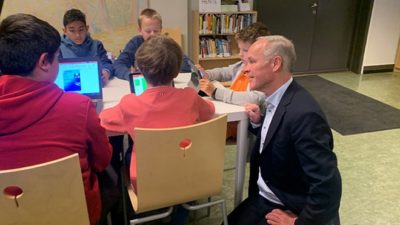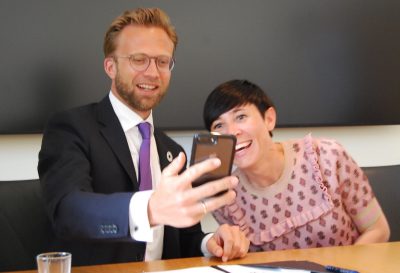Even one of the Norwegian newspapers that’s most critical of the country’s conservative government had high marks for the new teaching plans and curriculum unveiled by Education Minister Jan Tore Sanner this week. While it promotes digital competence, however, another minister wants to limit smart phone use for all children under the age of 13.

Sanner unveiled the first major curriculum changes in Norwegian schools for 13 years, with a promise that they’re aimed at better preparing students for the future. “Society is changing with new technology, new knowledge and new challenges,” Sanner said. That demands changes in the schools, not least with demands for digital expertise and better judgment.
Sanner’s ministerial colleague Nicolai Astrup ironically was simultaneously unveiling proposals to limit or even ban smart phones at elementary schools. “Children don’t need smart phones,” Astrup, the government minister in charge of digitalization, told newspaper Klassekampen on Tuesday. “If the main goal for them having a mobile phone is to maintain contact with their parents, it’s enough with an old-fashioned phone that can ring and send text messages.”
After reading in newspaper Aftenposten about how children spend many hours every day using Snapchat and playing games on smart phones, Astrup claimed they “steal lots of time at the cost of playing and social activity with other children. I see far too many children hung up by their smart phones.” He thinks parents should wait to give their children smart phones until they start junior high school.

Astrup’s warning may well be coming way too late, since new figures from the state communications authority (Medietilsynet) show that 87 percent of Norwegian 10-year-olds already have a smart phone. He admitted he may be “jousting at windmills,” but said that “when you see such a negative development, we as adults need to think about what we should do.”
Plan addresses risks of digitalization
Sanner, meanwhile, addresses the social risks of digitalization in the new teaching plans, which he says will make most children’s school days more practical and help them “learn more, and better.” The plans and curriculum also includes instruction in “good digital judgment, learning to be critical about sources of information, and keeping information secure,” he said, along with some early instruction in programming.
There will be more “learning through playing” in the elementary schools and more time to go into depth on various subjects. More interdisciplinary themes will also be applied to various school subjects, including democracy and citizenship, sustainable development and healthy mastering of life itself.
“Lots of teachers have wanted these issues to be included and I’ve listened to that,” Sanner said, referring to the lengthy hearing process to which the new teaching plan was subjected. Schools will also play a more active role in guiding as well as teaching, which is meant to rest on a foundation of respect for people and nature, and to value diversity and equality.
Plan wins high marks
Response was largely positive, with newspaper Dagsavisen applauding how the plan to renew Norwegian schools and enhance creativity and mutual respect “sends a healthy signal about a new direction.” The paper went on to editorialize how the round of hearings “was broad and good” and that “boosts confidence.”
There will also be less testing, with the only clear criticism coming over a decision to stop grading student’s performance in which version of the Norwegian language they’re less likely to use on a daily basis in the 8th, 9th and 10th grades, and in the first and second years at high school. A semi-annual evaluation will still be made, but advocates of nynorsk fear the new system will lower the status of that form of Norwegian more commonly used in the outlying districts, and further strengthen the more standard bokmål version of Norwegian.
Sanner, of the Conservative Party, said he expected more debate over the teaching plan, with the opposition Labour Party criticizing a lack of financing for all the changes. The Socialist Left party (SV) called for more emphasis on sustainable development.
“Everyone has an opinion about the schools, both based on their own experience and what they experience by having children in school,” Sanner told news bureau NTB, “so I expect there will be discussion.” Plans currently call for the new teaching plan to launch at the beginning of the 2020-2021 school year.
newsinenglish.no/Nina Berglund

